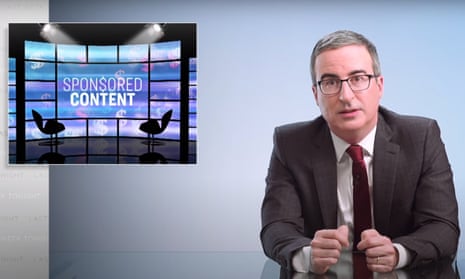John Oliver traced the fine, evermore corrupted line between local news and sponsored content on Last Week Tonight, going as far as successfully placing (on HBO’s dime) a bogus “sexual wellness blanket” on several local stations across the country.
So-called “brandigation placement”, in which product representatives pay stations to conduct padded interviews about consumer products, are widespread practice on local stations. Though the spots contain disclaimers – often buried or flashed onscreen for seconds – the bits’ chumminess with local anchors often add a sheen of legitimacy to products while still skirting FCC rules.
“A lot of times, stations are doing just enough to stay the right side of the FCC, but that does not mean that they’re not doing massive harm to their credibility,” Oliver explained. “Because even when a sponsorship is ‘properly disclosed’, I’d argue there are certain businesses local stations should not be selling themselves out for, especially when it comes to medicine.
“A surprising number of segments on these shows are enthusiastic, uncritical showcases for expensive treatments or devices that are – to put it charitably – medically dubious,” he added, pointing to a 2019 clip from ABC 4 Utah which promoted “home-use shockwave” device which alleged to treat both erectile dysfunction and cellulite. (The product, renamed from “the rocket” to “the phoenix” was registered with the FDA only as a therapeutic massager.)
“While there is no way of knowing exactly how many people are watching these shows as they air, that’s not really the point,” Oliver said. As a marketing executive from Nexstar, a local news conglomerate, explained to advertisers: “The cake is the video file” – four to five minutes of footage to be posted anywhere and everywhere. “That marketing executive is right – the cake is the video file,” Oliver said. “And companies will take that video and run with it,” often posting the clips online to legitimize dubious products.
“You might think viewers should be smart enough to approach anything on these shows with skepticism,” Oliver added, but “many of these stations also swap figures between their newsroom and their sponsored content shows,” further blurring the line between what is hard local news and what is paid promotion.
“Ideally, stations wouldn’t engage in this practice at all,” Oliver said, “or at the very least, their disclosures would be harder for their viewers to miss, and they’d do significantly more work to make sure that if they’re letting someone buy their way on to their channel and present something as real, that it’s not, in fact, total nonsense.
“Because right now, it’s far too easy to make a ridiculous product that makes outlandish claims, and get it on to local TV.” Case in point: Last Week Tonight’s own bogus company, Venus Inventions, and its absurd wellness product, the “Venus Veil: The World’s First Sexual Wellness Blanket,” complete with a fake website and a hired actress to “brandigate the shit” out of the product on local sponsored shows.
The HBO gag made it on to ABC 4 Utah’s Good Things Utah, hosted by the station’s chief medical correspondent, Surae Chinn. “It seems striking that [Chinn] didn’t have any follow-ups on claims that we made about the veil that you would hope a medical correspondent would immediately take issue with,” Oliver said, such as that the blanket’s design “draws out” the “alkaline undercurrents of the vagina” and that the product was part of the “field of magneto-genetics … developed in Germany 80 years ago” (“I would have some questions about that particular period in German history,” Oliver quipped).
The “Venus Veil” also got airtime on KVUE Austin’s sponsored show airing immediately after Thursday evening news, and an in-person showing on Denver’s Mile High Living. “None of this was nearly difficult enough to get on to TV, and it wasn’t even that expensive,” Oliver mused; the Denver Mile High in-person segment cost $2,800, KVUE Austin cost $2,650 and ABC 4 Utah cost $1,750. “It was all shockingly affordable and sadly, on some stations, didn’t even look that out of place,” he said.
“And that is not good. Because as we have said for years now, the integrity of local news is crucially important,” Oliver concluded, “and there is real harm for everyone if that integrity is damaged.”
